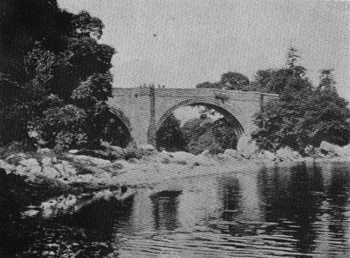The Campaign in Cumbria
On 1 March Brampton was reached and letters finally arrived from Mar. They were ten days old and he advised the army to march north to join him at Perth if they could not secure Newcastle. It was a little late for this course now and the leaders decided to push on south. The response from the Cumbrians was abysmal; their leaders were either imprisoned or seriously ill. With the weather worsening, morale fell. However on 3 November the army had its first real success. The Cumbrian Militia, estimated by Patten as 14,000 men, had been called out by the Bishop of Carlisle onto Penrith Moor. The ferocious reputation of the Highlanders preceded them and the entire militia fled 'in the utmost confusion, shifting every one for themselves as best they could' (Patten), leaving a good stock of arms and food for the grateful Jacobites. They pushed on through rain and cold to Appleby, Kendal and Kirby Lonsdale.
However on 3 November the army had its first real success. The Cumbrian Militia, estimated by Patten as 14,000 men, had been called out by the Bishop of Carlisle onto Penrith Moor. The ferocious reputation of the Highlanders preceded them and the entire militia fled 'in the utmost confusion, shifting every one for themselves as best they could' (Patten), leaving a good stock of arms and food for the grateful Jacobites. They pushed on through rain and cold to Appleby, Kendal and Kirby Lonsdale.
About this time, Charles Widdrington rode in with letters from the Catholics of Lancashire promising the fullest help and announcing that Manchester had declared for the Pretender. This news boosted the flagging morale of the Highlanders. Lancaster was reached on 7 November and taken without a shot. There was a ship with six cannon in the harbour, and a large quantity of brandy in the town. About a hundred local gentry rode in to join the Rising.
The leadership was again split. The Scots, looking nervously over their shoulders towards home, suggested they should use Lancaster as their garrison for the winter. The town had a port, a castle and good supplies. The Lancashire Jacobites could reinforce the town. If a Scottish or French army was to land in England, Lancaster was as good a base as any. Forster and the Northumbrians had other ideas.
Liverpool was a far better port and far easier to defend. Manchester was known to be in sympathy with the Jacobites. They had every confidence of being able to secure the whole of the North-west for the Pretender and raise considerable forces. The news that the regiment of dragoons garrisoning Preston had withdrawn was the clinching factor. The small army marched out of Lancaster on 9 November. It was a serious miscalculation.